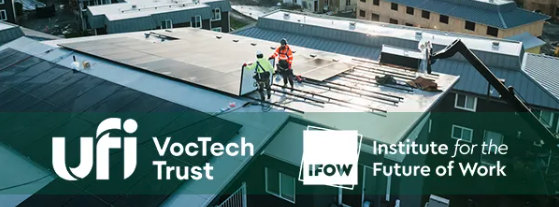
Projects


Current projects
EY Foundation / Motivating Futures
.png)
Project timeline: Jan 2025 - Jan 2025
Project description: Integrating analysis from work focusing on young people from low-income backgrounds with a future of work lens, the project is exploring how an intervention focused on intrinsic and internal motivation can help young people access better work through this age of rapid technological transformation. The report from Stage 1 of this project can be found here.
Ufi VocTech / Flourish

Project timeline: Jan 2025 - Jan 2027
Project description: Our data identified issues with skills development and a lack of career pathways in Grimsby and Cornwall due to industrial decline and a shortage of skills needed for modern jobs, particularly in the growing green energy sector. In this project, funded by Ufi VocTech, we are creating 'Flourish' - a system designed to help individuals understand their skills, explore green job opportunities, how their skills map to these jobs, and connects them with relevant vocational training.
CIPD / Innovate UK - Responsible AI in firms

Project timeline: Feb 2025 - Nov 2025
Project description: Building on findings from our Pissarides Review, this collaboration with the CIPD - using funding from Innovate UK - will aim to understand the areas of HR, organisation strategy, and people development practice crucial to successful AI implementation at work. It aims to build a deeper understanding of the processes of AI adoption, how AI is or could be used by organisations, and its impact on workers.
The Pissarides Review into the Future of Work and Wellbeing

Funder: The Nuffield Foundation

Project partners: Warwick Business School, Imperial College London
Project timeline: Sept 2020 - Jan 2025 (with extension projects ongoing to Nov 2025)
Project description: In partnership with Imperial College London and Warwick Business School, the Pissarides Review into the Future of Work and Wellbeing will research the impacts of automation on work and wellbeing, and analyse how these are differently distributed between socio-demographic groups and geographical communities in the UK.
BRAID UK / Gen AI and the Creative Industries

Project timeline: Feb 2024 - June 2025
Project description: In collaboration with Queen Mary University and the Alan Turing Institute - and following our Creative Arts breakfast supported by Somerset House, in this ‘CREAATIF: Crafting Responsive Assessments of AI and Tech-Impacted Futures' project we have been engaging with creative workers to co-develop impact assessments that address fundamental rights and working conditions in the context of generative AI. It aims to ensure that workers have a voice in the development of these technologies and corresponding labour policy. The initial reports from this project were published in June 2025.
BRAID UK / Gen AI and the Novel

Project timeline: Oct 2024 - November 2025
Project description: Led by IFOW Research Fellow Dr Clementine Collett, and working in collaboration with the Minderoo Centre for Technology and Democracy at the University of Cambridge, this project aims to develop policy recommendations surrounding generative AI and its impact on novel writing and publishing. Key issues such as IP, competition, and remuneration will be explored. This research uses participatory and co-design methods, collaborating with novelists, publishers, writers societies, policymakers, and tech companies.
Recent projects
Trust for London

Project timeline: Oct 2021 - Oct 2024
Project description: Developing, disseminate and applying our work on algorithmic systems and their impact on work for vulnerable and essential workers in London, with a focus on building practical solutions to prevent or reduce in-work poverty and risk of in-work poverty.
Joseph Rowntree Charitable Trust

Project timeline: Feb 2023 - Feb 2025
Project description: Exploring, testing and delivering new accountability mechanisms to mitigate risks of growing inequalities at work arising from the use of AI.
Digit Futures at Work

Project timeline: Sept 2023 - Sept 2024
Project description: Conducting focused policy roundtables and ensure that policymakers, parliamentarians and the media are aware of the latest developments and research relating to workplace technology, working in partnership with the Digital Futures at Work Research Centre (DIGIT), an established ESRC Research Centre.
Alex Ferry Foundation

Project description: Developing a BluePrint for Collective Access and considering the role of collective bargaining in negotiating workplace technology. This project has been undertaken in partnership with the TUC.
Friends Provident

Project timeline: Jan 2024 - Dec 2024
Project description: Action research to implement governance frameworks which help organisations identify the source of new forms of value capture when adopting workplace technology, leading to the publication of a set of case studies and the refinement of our tools for responsible innovation.
Many thanks to former funders...
Including





